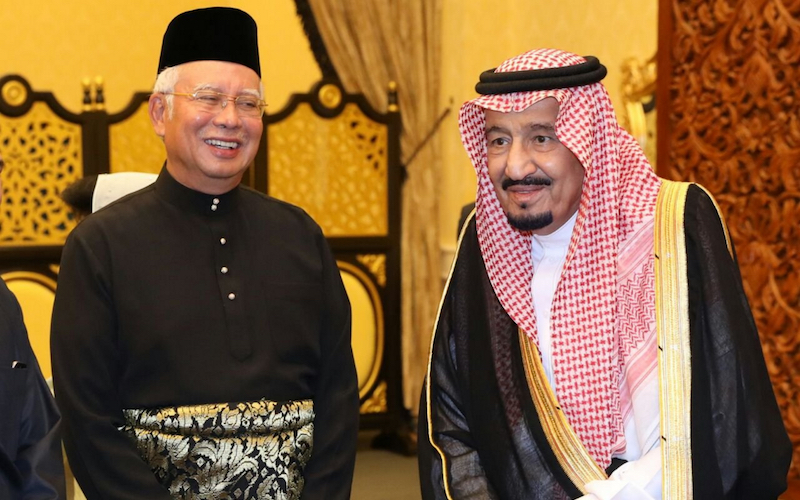
King Salman’s Tour De Asia: Rolling out the Red Carpet
A few days ago, Saudi King Salman launched his Asia visit to renew bilateral ties with many of Saudi Arabia’s closest allies. Along with his 600 men delegation, the Saudi king will be stopping in Indonesia, Malaysia, Brunei, Japan, China, the Maldives, and back to the Middle East with a stop in Jordan. Saudi Arabia’s interests in this trip may rely on energy and investment opportunities, but its geopolitical significance has separated the trip into two priorities: “China and Japan will fulfill one set of priorities while the trips to Malaysia, Indonesia, and Maldives satisfy another.” Another significant factor of the Saudi king’s visit is to maintain Muslim friendship with the mostly Sunni countries in the Asia-Pacific region.
The Saudi King’s first stop on his Asia tour was in Malaysia, a country that is mostly Sunni Muslim. His visit to Malaysia was welcomed by all and has marked a new era in Saudi-Malaysian relations. This is not the first time a Saudi king has visited Malaysia, in fact this is the third time. King Faisal visited the mostly Sunni country in 1970 and King Abdullah paid a visit to Malaysia in 2006.
On February 27, both Kuala Lumpur and Riyadh signed four memorandum of understandings (MoU) related to trade, investment, employment, and human resources. The MoUs also included haj services, aerospace, and construction. Saudi Arabia’s largest oil firm, Saudi Aramco, along with Malaysia state oil firm, Petronas, will also invest $7 billion in oil refineries and petrochemical projects in the small Southeast Asian nation. However, Bridget Welsh, a professor at the Center for East Asia Democratic Studies at the National Taiwan University believes that King Salman’s visit to Asia could cause concerns for its alliance with the United States. In an interview with Free Malaysia Today, Welsh stated the visit as “less about Malaysia and Indonesia, than a recognition by the Saudi government that the new global environment, especially the (US President Donald) Trump administration, is not as favourable for them.”
However, King Salman believes that Malaysia could serve as a role model for preserving Islam for development and success. As one of the ‘Asian Tigers,’ Malaysia’s “economic institutions have a proven record of experience as a strong competitor to their counterparts in the West, specifically when it comes to achieving assigned projects.” So far, both countries have benefitted from cooperating on information technology, training professionals in the workforce, building better infrastructure, and improving health care.
King Salman’s next stop in his Asia tour was in Jakarta, Indonesia, leaving the plane on a golden escalator and greeted by Indonesian president Joko Widodo, Jakarta governor Basuki Tjahaja Purnama, Foreign Minister Retno Lestari Priansari Marsudi, Minister of Religious Affairs Lukman Hakim Saifuddin. Indonesia is an important country because it is the largest Muslim populated country in the world with over 200 million followers. However, the two nations focused on economic issues and have signed “11 cooperation agreements following Wednesday’s talks at the Bogor palace.” In accordance with these 11 agreements, Saudi Arabia has made a commitment to providing a billion dollars for economic development as well as fighting drug-trafficking and terrorism. In addition, Jakarta and Riyadh made agreements on healthcare, science and combatting crime and have committed more investment in energy firms including “Aramco and Pertamina to expand an Indonesian oil refinery.”
King Salman has also committed to fight the Islamic State with Indonesia. Even though radicalization in Indonesia remains limited, there is still a growing concern for this as well as a growing concern about the Islamic State. Even one of Indonesia’s anti-Wahabbist groups, Nahdlatul Ulama, have growing concerns about Saudi money being infiltrated to spread Wahabbist ideology, an ideology that we must not forget, originated in Saudi Arabia. According to the Saudi Envoy to Indonesia, another 10 agreements will be signed to help counter Islamic terrorism that is a threat to not only the two nations, but the entire world. The Saudi Envoy also said that Saudi Arabia will continue investing in Islamic schools in Indonesia so that students can increase their chances for scholarships, and many can learn the Islamic faith in the Arabic language. Saudi Arabia has also hinted at investing in oil and gas pipelines, as well as promoting more tourism between the two nations.
Tokyo and Beijing see their relationships with the kingdom as vital to their national economic interests. Saudi Arabia sees China as a counterweight to the United States in the Middle East, and sees Donald Trump’s foreign policy towards China as uncertain. With regards to the geopolitical situation in the Middle East, China has been on an even footing when it comes down to its relations with Riyadh and Tehran. Saudi Arabia has criticized China’s support for the 2015 Joint Comprehensive Plan of Action (JCPOA), and its influence leading to Iran becoming a stronger player in the region. Beijing will not tolerate Saudi Arabia’s ambitions in the Middle East, but China wants to maintain a balance when it comes to the two juggernauts in the Middle East.
Despite some of Saudi Arabia’s criticisms of China, Saudi forces have conducted military drills with Chinese forces that relate to anti-terrorism and relationship building. In addition, Chinese military officials have built on their relationships with Gulf countries in Oman, Saudi Arabia, and the United Arab Emirates in relation to Chinese ports for trade, and operational zones for strategic interests. The One Belt, One Road Initiative will also protect China’s interests in the Middle East along with a cooperation agreement between China and the GCC that is expected soon.
However, it is not known how soon this will be implemented. In fact, China has already made significant progress in the Middle East, “including the $1.8 billion railway that the China Railway Construction Corporation built to transport pilgrims performing the Hajj, the UAE pipeline from the Habshan oil field to its Indian Ocean coastline in Fujairah, allowing it to bypass the Hormuz Straits in getting oil to the market.” In order for the Gulf states and China to advance their ambitious relationship, they need to not only cooperate on trade issues, but on security issues as well.
Prime Minister Abe and King Salman have both agreed to increase the amount of investment coming from Riyadh and Tokyo. In addition, King Salman will make security one of the top issues during his visit to Tokyo. Some of these issues include “cooperation in fighting terrorism, as well as a greater Japanese involvement in maintaining safe sea lanes between the Middle East and Asia.” Japanese Ambassador Norihiro Okuda stated that King Salman’s visit to Japan was an “opportunity for both Saudi Arabia and Japan to reaffirm their sound bilateral relations over the past six decades, and to kick off an ambitious exercise to enhance collaboration to create (a) vibrant society and thriving economy through implementation of Saudi Vision 2030 and National Transformation Program 2020.” Also, both countries have committed to expanding the defense agreement that was ratified last September.
King Salman’s visit to Asia is not only an economic model for the Saudi kingdom, but it is also a symbol of maintaining its leadership throughout the Muslim world. In addition, the strategic planning of the National Transformation Plan (NTP) towards the east is a diversification of Saudi Arabia’s global agenda. Some leaders in Washington are still somewhat concerned that Saudi Arabia’s National Transformation Plan (NTP) can shift the American order into something that is more complex for Saudi influence in other Southeast Asian countries like Indonesia and Malaysia. However, Saudi Arabia continues to diversify its global interests, especially with fellow Sunni brothers.

